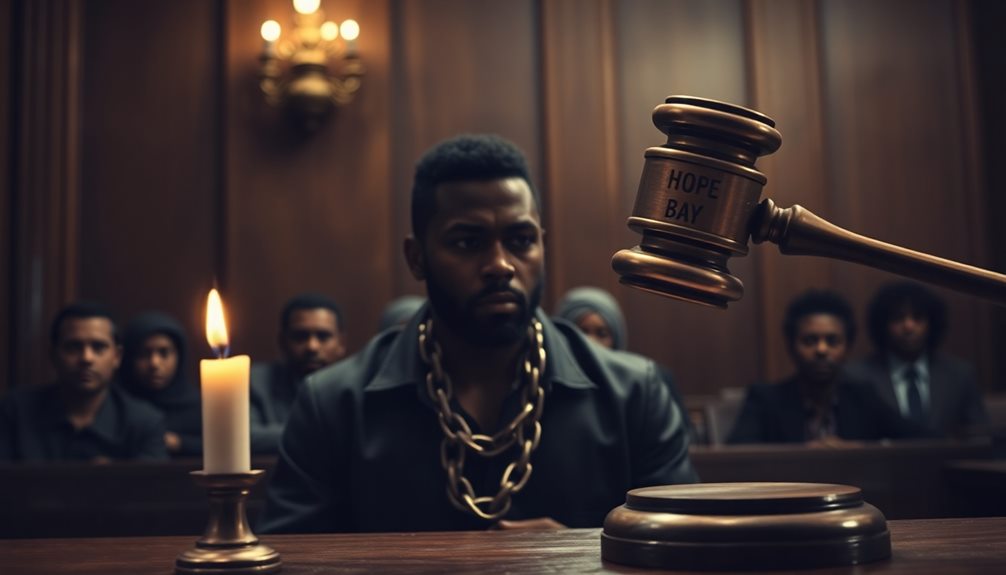'A Lesson Before Dying' explores the themes of dignity, systemic racism, and human connection in 1940s Louisiana. You follow Grant Wiggins as he grapples with the injustices faced by Jefferson, a wrongfully sentenced man. Their evolving relationship highlights the power of empathy and love amidst dehumanizing circumstances. Education plays a vital role, serving both as a means of empowerment and a barrier shaped by societal biases. The narrative emphasizes personal responsibility and redemption, showing how small acts can challenge broader injustices. As you dive deeper, you'll uncover more about these compelling themes and their impact on the characters' lives.
Overview of the Novel
"A Lesson Before Dying," set in 1940s Louisiana, presents a powerful narrative about Grant Wiggins, a black teacher who endeavors to help Jefferson, a man wrongfully sentenced to death, reclaim his dignity before execution.
The story unfolds against a backdrop of rampant racism, showcasing the systemic injustices that African Americans endure during the Jim Crow era. Similar to Richard Wright's exploration of systemic oppression in Bigger's tragic journey, this novel highlights the dehumanizing effects of a racially biased society.
As you immerse yourself in this poignant tale, you'll witness Grant's struggle to connect with Jefferson, who initially feels defeated and dehumanized by society's prejudice.
Grant's mission isn't just about saving Jefferson's soul; it's about instilling a sense of self-worth in a man society has tried to erase. Through their evolving relationship, you'll see how empathy and personal responsibility can create profound change.
Gaines skillfully illustrates the brutal realities of racism, but he also highlights the transformative power of love and human connection.
Jefferson's journey toward asserting his humanity serves as a compelling reminder of the dignity that everyone deserves, even in the face of dehumanization.
This novel isn't just a story; it's a call to understand the complex fabric of race relations and the moral obligations we've toward one another.
Themes of Racism
Set against the backdrop of 1940s Louisiana, "A Lesson Before Dying" starkly reveals the pervasive racism that shapes the lives of its characters. The novel highlights a society where systemic discrimination is embedded in every aspect of life, particularly within the legal system.
Jefferson's wrongful conviction demonstrates how the judicial system is designed to dehumanize black individuals, painting them as inherently guilty and inferior. This bias is a grim reality that reflects the broader societal attitudes of the time, reminiscent of the collective action against oppression seen in World War II resistance movements.
You see the economic disparities between black and white workers on the plantation, revealing the exploitation and marginalization of black laborers.
Grant Wiggins, as the only educated black man in the community, grapples with his identity amidst such pervasive racism. His struggle illustrates the internal conflicts faced by individuals trying to navigate a world that continuously undermines their worth.
Racism isn't just an external force; it seeps into interpersonal relationships and community dynamics. Characters wrestle with internalized prejudices, revealing how deeply entrenched these societal hierarchies are.
Ultimately, the novel forces you to confront the harsh realities of racism and its profound impact on human dignity and connection.
The Role of Education

In "A Lesson Before Dying," education plays an essential role in both empowerment and the barriers that hinder learning for marginalized students.
The struggles faced by Grant Wiggins echo the challenges experienced by many unsung educators who endeavor to make a difference despite systemic obstacles.
You'll see how Grant Wiggins struggles to connect traditional educational methods with the unique challenges his students face in a racially biased society.
This tension highlights the need for personal connections and mentorship to create meaningful change in the lives of those he teaches, reminiscent of the transformative impact of visionaries of educational reform throughout history.
Education and Empowerment
Throughout the novel "A Lesson Before Dying," education emerges as a pivotal theme, shaping the lives of characters like Grant Wiggins and Jefferson.
You see, Grant serves as a teacher in a racially biased community, revealing the complexities and limitations of education in empowering African-American students. His initial cynicism about teaching reflects his struggle to inspire his students amidst systemic racism. You realize that the traditional education system often fails to meet the real needs and cultural contexts of impoverished students.
Jefferson, wrongfully convicted and sentenced to death, symbolizes the societal neglect of education as a means of empowerment for marginalized individuals. His journey highlights how education can be transformative, but only when it's relevant and meaningful.
By the novel's end, you notice that Grant's relationship with Jefferson evolves. It's not just about academic lessons; it's about forming personal connections and emotional investments that enhance the impact of education.
In this way, education transcends mere instruction, becoming a tool for empowerment and hope. You discover that through understanding and compassion, characters can reclaim their dignity and humanity, illustrating the profound potential of education when applied thoughtfully.
Barriers to Learning
Barriers to learning in "A Lesson Before Dying" stem from a complex interplay of systemic racism, socioeconomic challenges, and cultural disconnection. As you explore Grant Wiggins' role as a teacher in a racially biased environment, you see how these factors shape the educational system.
Grant faces immense difficulties in engaging his impoverished students, who are more focused on survival than academics. This reality highlights how socioeconomic barriers hinder access to quality education and limit their learning opportunities.
The narrative critiques the educational system, revealing how it often reinforces white values and neglects the rich cultural heritage of African Americans. You can't help but notice Grant's initial doubts about the effectiveness of his teaching. He believes traditional methods yield minimal results, prompting him to reconsider how education can truly empower his students.
Despite these obstacles, Grant's journey showcases the potential of education as a transformative tool. He advocates for adapting teaching methods to better serve the community's unique needs, emphasizing that overcoming barriers to learning requires a tailored approach.
Ultimately, Grant's struggle illustrates the critical importance of relevant and culturally responsive education.
Redemption and Dignity
Redemption and dignity intertwine profoundly in "A Lesson Before Dying," as Jefferson's journey illustrates the transformative power of self-acceptance.
Initially trapped in despair, Jefferson struggles to see his worth, but through his relationship with Grant Wiggins, he begins to reclaim his identity. In a similar vein, Liesel Meminger's love for books in the face of oppression symbolizes hope, showcasing how personal growth can emerge from the darkest circumstances.
Grant, at first, finds it challenging to convey the essence of dignity, realizing that it transcends mere education. Instead, he discovers that true dignity is rooted in self-acceptance and love.
As Jefferson confronts his fate, he embodies redemption in the face of adversity. His acceptance of his circumstances reflects a journey toward reclaiming his humanity, emphasizing that dignity comes from within, regardless of societal judgment.
Reverend Ambrose's insights further enrich this theme, revealing that dignity isn't just personal but also a spiritual endeavor.
Injustice and Responsibility

In "A Lesson Before Dying," you see how systemic racism profoundly affects both individuals and communities, shaping lives and destinies.
The struggles faced by characters echo the challenges found in immigrant experiences, such as those depicted in the struggles of immigrant communities.
As you follow Grant's journey, you realize the importance of personal accountability in addressing injustice and the transformative power of empathy.
Ultimately, the novel challenges you to recognize your role in fighting against societal wrongs and restoring dignity to those marginalized by the system.
Systemic Racism's Impact
Systemic racism manifests as a profound injustice that permeates the lives of individuals within a biased legal framework. In "A Lesson Before Dying," you see how Jefferson's wrongful conviction starkly highlights the pervasive injustices faced by black individuals during the Jim Crow era. The judge's derogatory remarks during Jefferson's trial serve as a glaring example of dehumanization, revealing a legal system that prioritizes race over justice.
As you witness Grant's journey, his initial indifference toward racial injustice transforms into a deep sense of personal responsibility. He recognizes that he must advocate for Jefferson's dignity in a prejudiced environment. This realization emphasizes that the fight against systemic racism isn't just about individual actions; it's about collective responsibility.
The narrative also illustrates how the community's complicity perpetuates systemic racism, shaping the roles and actions of both Grant and Jefferson. Through Jefferson's path toward self-acceptance and dignity, you understand that confronting injustice goes beyond personal struggle—it requires challenging societal norms and expectations.
In this way, the story compels you to reflect on the broader implications of systemic racism in your own life and community.
Personal Accountability in Injustice
Personal accountability emerges as an essential theme in "A Lesson Before Dying," urging readers to reflect on their own roles in confronting injustice. As you follow Grant Wiggins' journey, you witness his struggle with indifference towards systemic racial injustice. Initially, he feels detached, but his involvement in Jefferson's wrongful conviction forces him to confront his own responsibility. This shift is significant; it shows how personal accountability can ignite change.
As Grant becomes more engaged, he evolves from a passive observer to an active participant in the fight for justice and dignity. His development highlights that recognizing injustice isn't just a moral duty; it's a pathway to personal growth.
In your own life, consider how small actions can contribute to broader societal change. The narrative illustrates that when individuals acknowledge their roles in perpetuating injustice, they can uplift marginalized voices, like Jefferson's.
Ultimately, it's a call to action: you have the power to confront systemic issues and inspire others to do the same. By embracing personal accountability, you can be part of the solution in dismantling injustice in your community.
Transformative Power of Empathy
Recognizing your own role in confronting injustice often opens the door to the transformative power of empathy. In "A Lesson Before Dying," you see how Grant Wiggins evolves from a cynical teacher to someone who feels a personal responsibility toward Jefferson, a man wrongfully convicted of murder. This journey shows you that empathy isn't just about feeling for someone; it's about taking action and fostering connections.
As Grant interacts with Jefferson, he confronts his own complicity in societal racism. The systemic injustices Jefferson faces serve as a catalyst for Grant's transformation. He learns that by acknowledging Jefferson's struggles, he can challenge the prejudiced views of those around him. Their relationship illustrates how empathy can lead to personal growth and social awareness.
Ultimately, Grant's commitment to restoring Jefferson's dignity highlights that taking responsibility for the injustices faced by others is essential. This step not only leads to personal redemption but also promotes societal change.
Through empathy, you realize that confronting injustice isn't just an external battle; it's an internal journey that can redefine your understanding of humanity and your place within it.
Love and Transformation
In "A Lesson Before Dying," love plays a crucial role in driving transformation, illustrating how deep connections can spark personal growth. Initially, Grant Wiggins' visits to Jefferson are spurred by his girlfriend Vivian's encouragement, revealing that love often motivates our actions more than obligation does.
Coates' exploration of identity and community resonates here as Grant navigates his own sense of self within a racially charged society, similar to how Coates captures the struggles faced by Black Americans through personal relationships and connections the complexities of racism. As Grant spends time with Jefferson, the support and kindness they share inspire Jefferson to embrace his dignity and act courageously, despite his grim circumstances.
Jefferson's journey showcases the profound impact of love and human connection, transcending the societal and emotional barriers he faces. The novel emphasizes that love is a more significant force than duty in shaping the characters, particularly in how it fuels Grant's commitment to his teaching and community.
Through their evolving relationship, both Grant and Jefferson learn invaluable lessons about self-worth and the importance of relationships.
Ultimately, love fosters resilience and hope amidst adversity, demonstrating its transformative power. As you witness their growth, you realize that love not only enriches their lives but also acts as a catalyst for change, highlighting its essential role in the quest for dignity and understanding.
Alcoholism and Its Impact

Throughout "A Lesson Before Dying," alcoholism emerges as a significant barrier to both personal and communal progress, profoundly affecting the characters' lives and decisions. You see how Jefferson's struggle with alcohol intensifies his despair, clouding his recollection of the wrongful conviction that led to his death sentence. This haze of intoxication strips him of agency, making it harder for him to confront his situation and find a path to dignity.
The narrative serves as a poignant reminder that resilience and personal growth can be stifled by such vices, highlighting the need for individuals to overcome these challenges to reclaim their lives.
Grant Wiggins also turns to alcohol as a means of escape from his emotional turmoil. His dependence complicates his relationships with Vivian, Jefferson, and Tante Lou, showing how personal struggles can bleed into communal ties.
The prevalence of alcoholism among the characters serves as a reflection of wider social issues, intertwining with the experiences of racism and poverty that plague their community.
Ultimately, the narrative illustrates that alcoholism diminishes one's capacity for agency and hope, contributing to a cycle of despair that complicates the characters' quests for redemption.
You're left to ponder how these struggles can overshadow their aspirations and hinder progress, both individually and collectively.
Religion and Hope
Amid the challenges posed by alcoholism, the characters in "A Lesson Before Dying" turn to religion as a source of hope and strength. In the racially oppressive environment of Bayonne, Louisiana, the community clings to Catholic beliefs, finding comfort in faith during difficult times.
The exploration of resilience and personal growth mirrors the human spirit's struggle against adversity, much like the themes found in Dickens' "David Copperfield." Reverend Ambrose's insistence that Jefferson pray before his execution exemplifies how religion can provide solace amid despair.
You witness Grant Wiggins, the protagonist, grappling with his skepticism towards organized religion. His doubts reflect a struggle against the injustices surrounding him, yet the narrative reveals that even in his cynicism, hope is possible.
The contrasting views between Grant's agnosticism and the community's fervent faith highlight a complex relationship between belief and hope.
Ultimately, you see that religion serves as a pillar of spiritual resilience for many characters. Through communal support and shared faith, individuals like Jefferson can find dignity, even in their darkest moments.
This exploration of religion and hope underscores the novel's core message: that faith, despite its flaws, can still inspire strength and foster a sense of community amidst overwhelming odds.
Heroism and Sacrifice

Heroism and sacrifice are intricately woven into the fabric of "A Lesson Before Dying," challenging readers to reconsider what it means to be a hero. Throughout the novel, you see Grant Wiggins redefining heroism, realizing that true heroes act selflessly for others instead of seeking personal gain. This theme is further embodied by Jefferson, who evolves from despair to dignity, accepting his fate with grace as a powerful act of defiance against societal judgment.
The resilience demonstrated by characters like Jefferson mirrors the triumph of the human spirit found in survival stories, such as Louis Zamperini's in "Unbroken."
Initially, you witness Grant's reluctance to shoulder the responsibility for Jefferson's transformation, highlighting his internal conflict between self-interest and the call to act heroically. As he commits to helping Jefferson find dignity, you recognize that heroism often demands personal sacrifice, taking an emotional toll on him.
Yet, Grant's journey reveals that such sacrifices can lead to profound change. Jefferson's path toward understanding his own worth serves as a potent reminder that acts of courage and self-sacrifice can inspire not only individual growth but also uplift entire communities.
In this way, the novel challenges you to reflect on your own understanding of heroism and the sacrifices it may require.
Conclusion
In "A Lesson Before Dying," you see the struggle for dignity, the fight against injustice, and the power of love. You witness characters transform, learn, and grow, reminding you that education can illuminate even the darkest paths. You feel the weight of responsibility and the hope that faith can bring. Ultimately, you're left with the understanding that redemption is possible, that sacrifice is noble, and that every lesson learned shapes who we become.



